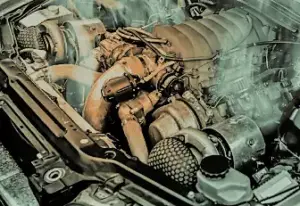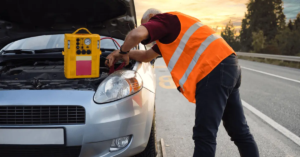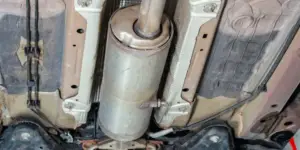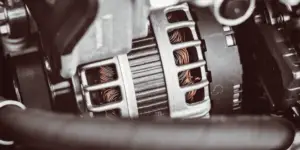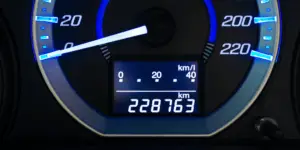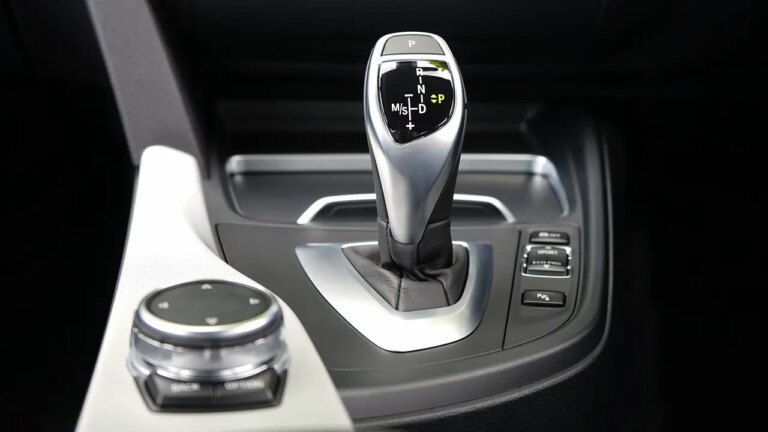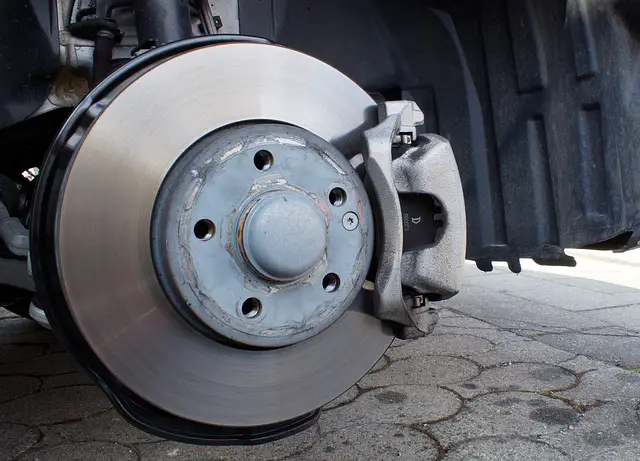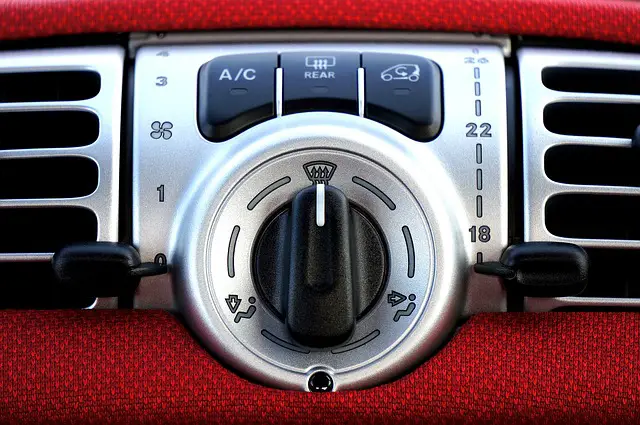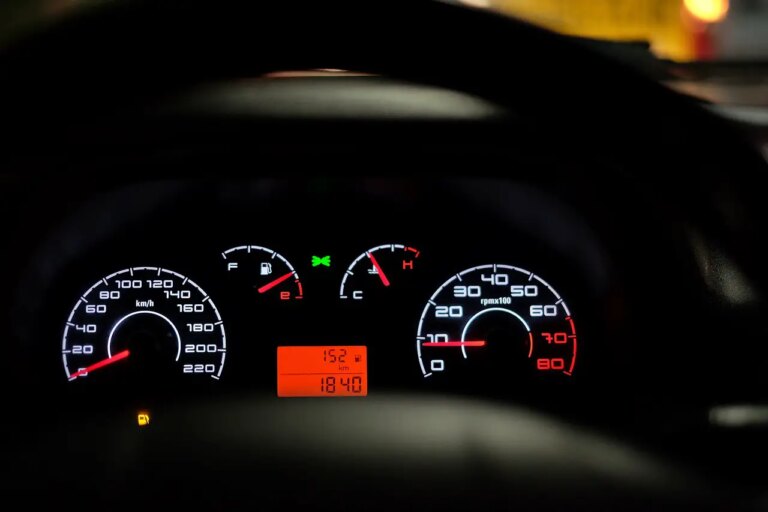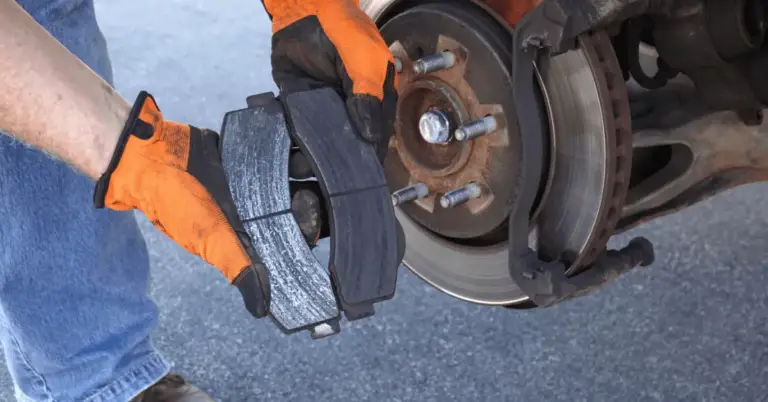Is Your Car Alarm Going Off For No Real Reason?
Most people have been here before. It’s stressful in two ways.
Not only does it get you to go to the window and check your car isn’t being stolen, but when it happens at night, it can also raise your stress levels as you know your car is waking up the neighbors.
Common Reasons Your Car Alarm Goes Off Randomly and What to Do About It
Alarm systems are an integral part of any car. It’s there to protect your car from crime. But not many people know the basics of how it all works.
Your car alarm has many sensors; anyone can go wrong and cause the alarm to go off.
The slightest change from the norm by any of these detectors can cause a false alarm activation that annoyingly fails to reset itself properly.
The result is alarm activates, then stops – you hold your breath and hope the alarm comes on again and the stress levels go up. Repeat!
Here are seven reasons your car alarm goes off for no apparent reason.
- Low car battery charge or dead battery
- Sensitive sensors
- Battery terminals that are corroded or rusty
- Dirty hood latch sensor
- Poor connection to the control unit
- Broken key fob
- Faulty alarm relay
- A wrongly installed alarm
Now we’ll explore them in more detail:
Dead or Drained Battery
Is a low car battery causing the alarm to go off, or is the faulty car alarm draining the battery? There’s only one way to check, and that is to test the battery out.
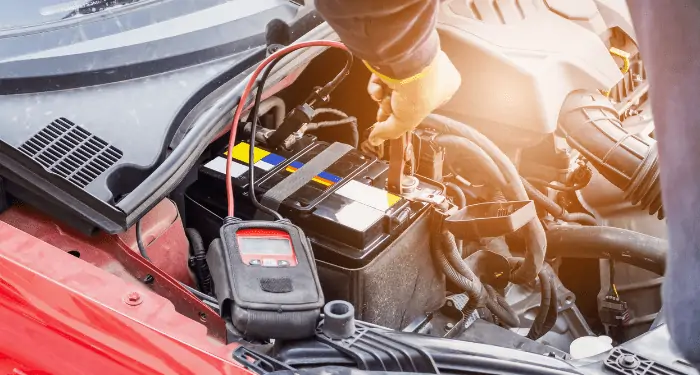
A voltmeter will let you know if the battery is drained, and they are cheap too. A good one will cost $20 but will save you money on getting a replacement battery unnecessarily.
If the car battery is low on charge, the alarm will sense this, and some makes will go off to alert you of this. Unfortunately, this drains the battery further.
Corroded or Rusty Battery Terminals
If your battery is charged to a reasonable level, you should also check your battery terminals. A rusty terminal can cause the alarm to sound by sending a low signal to the system. As mentioned above, it will activate if it believes there isn’t enough juice in the battery to allow it to operate correctly.
It’s not just the car alarm that will go off if your battery terminals are corroded. It’s also likely that your car will have trouble starting too.
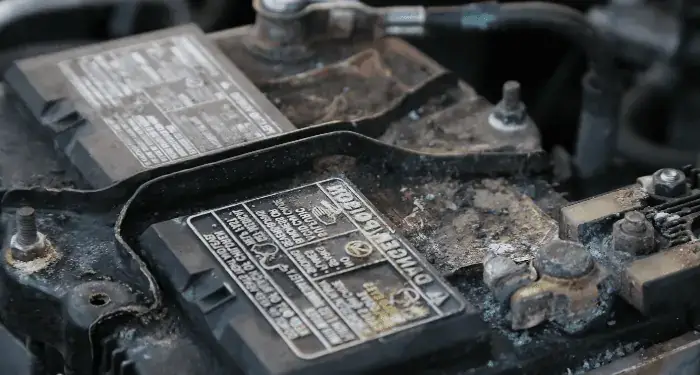
You can clean the terminals yourself if they are rusty or corroded.
Disconnect the battery cables, and use a battery cleaner or a can of coke to clean away the corrosion.
There are other ways to get a dead battery working.
Damaged Key Fob
This can happen a lot. Most car fobs have a light that shows you when a button is being pressed – but not all.
If your car key fob doesn’t have a light check, it’s condition. Could pressure inadvertently be placed on one of the buttons and connectors inside it?
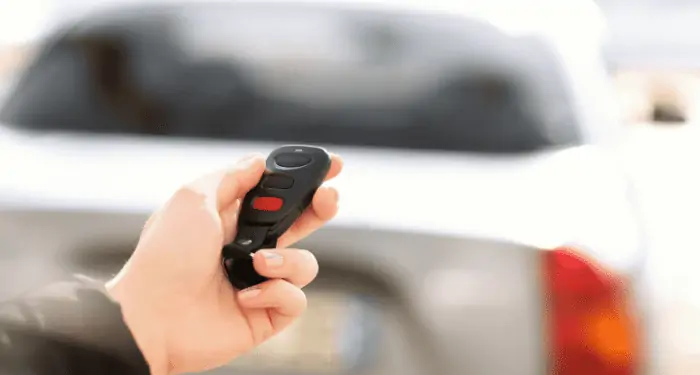
If your remote is damaged or defective, your car alarm can go off randomly.
A broken remote can send erroneous commands to your car alarm and cause it to turn on for no apparent reason.
Faulty Car Alarm Relay
Located under the hood is your fuse box. Now, the fusebox stores more than just fuses. It also stores relays.
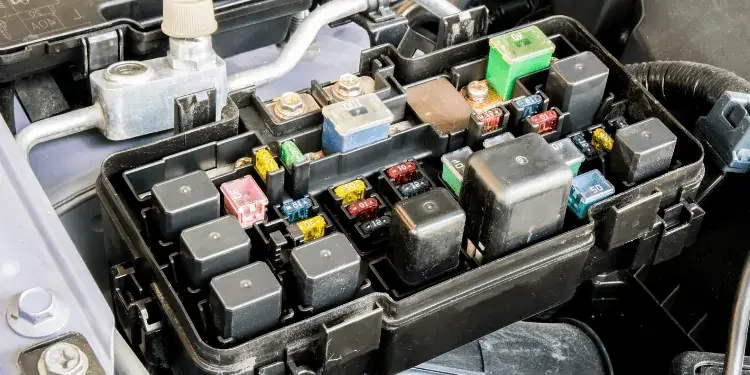
When they go wrong, relays are switches that can leave a circuit open, which results in an electrical system remaining on.
Many car alarm systems will have a relay in the fuse box that can get stuck in the open position.
Dirty Hood Catch and Sensor
Car alarms have many sensors – far more than 30 years ago. A relatively new one is the hood sensor. It is designed to stop thieves from getting easy access to your engine and other valuable car parts.
The sensor will sound an alarm if someone opens the hood with force, but it can also trigger if the sensor has dirt or grime around the latch that stops it close tightly.
When dirty, even if the hood is closed, the alarm can activate.
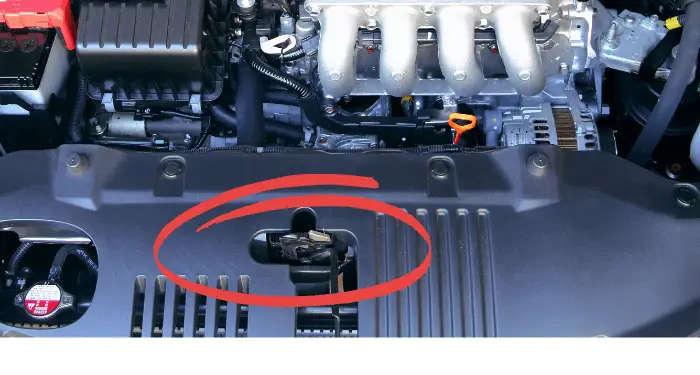
Open the hood and look around the latch. Is it clean? You may have found the culprit if it or the sensor looks dirty.
First, disconnect the negative terminal of your battery and then give it a clean with a cloth and some liquid cleaner.
You’re likely to generate dust when you do this, so make sure you leave the sensor dust-free too, or the hood sensor may still give off false readings to the alarm.
Delicate Shock Sensors
Sensitive shock sensors can also be responsible for car alarms that go off. These sensors detect any shakes or vibrations your car experiences.
Your shock sensors can be adjusted if they are too sensitive, and your car alarm goes off for no good reason. If it’s a windy day or night, this is likely a cause.
You can check your sensors by gently bumping into your car.
You may be able to reset the sensors if your alarm goes off by referring to the guidelines outlined in your specific car alarm literature.
These sensors are located under the dashboard in a small box, but their location varies according to the car model.
Door and Trunk Sensors
These sensors are very similar to the hood sensors we mentioned.

They work by being depressed when the door or hood is shut firmly, but if the switch is stuck, it can give a false reading to the car’s ECU. In some models, that switch is incorporated into the switch, which triggers the car cabin light.
To check if the switch is working correctly, open the trunk and each door and look for a button on the car’s body that can be depressed.
If you find a sticky one, this is likely to be the cause of the problem.
Bad Pressure Sensors
Often reserved for luxury car brands, pressure car alarm sensors detect a slight change in pressure when a car door is opened or when a window is broken. When a car door is opened, there is a slight decrease in pressure, and the car’s alarm can pick this up.
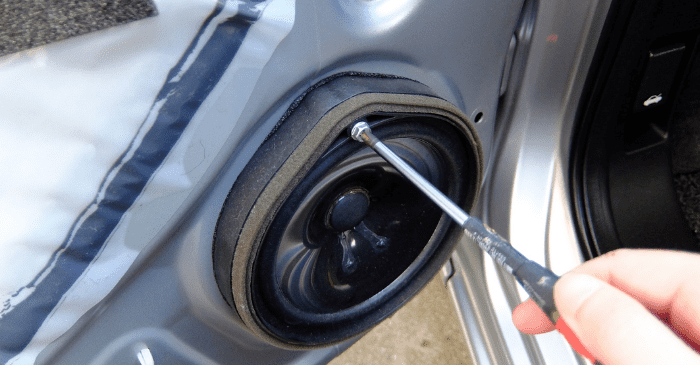
Some people in high crime areas that don’t have a car alarm with pressure sensors as standard will get these installed as an extra. If you’ve just bought a car, you may not even be aware that these types of sensors are in the cabin. They are often incorporated in car speakers as they can look unsightly if fitted in the cabin.
Microphone Sensors
Once again, a more high-end car alarm feature.
But they are becoming more common as a standard feature. It’s like a fail-safe feature which means if the other alarm features haven’t been activated and a thief gets into your cabin, any noise they make – when the alarm is active – will set the alarm off.
Proximity Sensors
You’ll own a very expensive car to have these fitted as standard! Almost futuristic, these sensors detect the presence of movement close to your car. Even more impressive than that is sensors can tell what the presence is. If it’s an animal, they won’t trigger the alarm unless we’re talking about a large animal, perhaps a deer or a bear.
Smaller domestic animals like cats and dogs should not be setting the alarm off at all.
Loose ECU Connection
Your car’s ECU is your car’s brain and receives many signals from a range of sensors and valves.
If the alarm still goes off randomly after you have cleaned it, the problem could be due to a weak connection to the central control unit of your car.
A good idea is to test your ECU for error codes. For this, you need an OBD reader. A specific code relating to the problem is stored within the ECU when your car has a fault. The OBD takes the guesswork out of fault diagnosis.
A Badly Installed Car Alarm System
Is your car alarm new, or have you recently bought the car? Always take a car back to the car alarm fitter to diagnose a problem before fault-finding yourself.
This is especially true if you haven’t got a fault reader to indicate the cause of the problem. There is no need to replace parts until you know the fault location. You could be spending money that you don’t need to.
How to Stop Your Car Alarm From Continually Going Off
Lock and Then Unlock Your car
It seems obvious but let’s get the obvious out of the way first. Unlock the car with the key fob and then lock it again. Do this a few times and listen to the sounds of your car’s central locking system.
Is it engaging correctly, or do you hear two noises about a second apart? This would be a sign that the car is trying to lock but is being stopped from doing so.
Turn Off The Alarm Switch
Some car alarms – the older ones- have a switch in the car that allows you to turn the alarm off manually. The placement of this switch varies but is usually found in the cabin underneath the dashboard. Most modern cars don’t have these, but some after-market cheaper alarms still do.
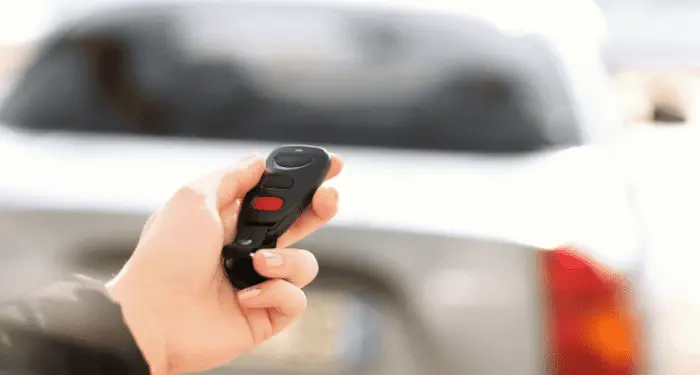
Start Your Car Up and Turn It Off Again
Like most electrical things, turning it off and back on can sometimes help it reset itself. This is unlikely to work but is always worth a try.
Reset your Alarm System
As we’ve discussed, the ECU stores error codes, but if the code isn’t cleared, it can cause the car alarm to go off even with no current reason.
An OBD reader will inform you of any current codes affecting the alarm, and you’ll be able to reset them through your OBD.
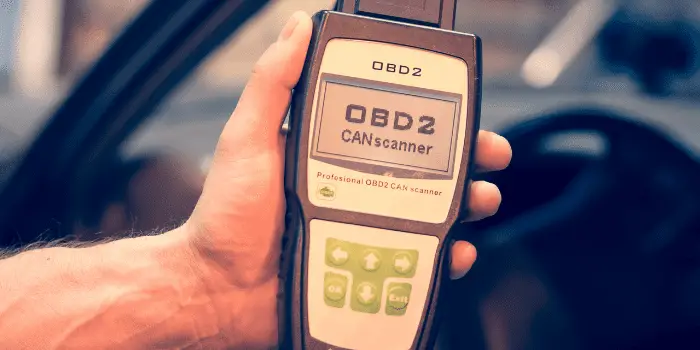
Often – when the fault is temporary – it is all that is needed to stop the alarm from going off. Unfortunately, clearing the code on a persistent problem won’t work, as when the ECU gets told there is still a problem, the code will be stored again.
Disconnect your Battery
If you are getting no sleep and see the neighbor’s lights coming on, disconnect the battery and sort the problem out in the morning.
You may be worried that your car could get stolen if the alarm isn’t on but don’t worry, as if the battery is disconnected, the starter motor won’t turn, so your car isn’t going anywhere.

If all else fails, you can disconnect the battery. Always remove the ground terminal first.
The alarm might briefly continue if there is a backup power supply, but that should soon run out.
Tap or Replace the Relay
Check the fuse box lid legend and locate the alarm relay – some cars don’t have alarm relays. But if yours does, tap it lightly, as this often frees it up and gets it working again. You can swap it with another relay in the fuse box to see if that fixes the problem.
If your alarm stops with a different relay in place, it’s a good sign that the relay was causing the problem.
In Conclusion
Car alarms are great when they work well but can be a real hassle when they go wrong.
Our advice is always to check out the fob first. Even remove the batteries and see if this helps. If the car alarm doesn’t come on when you’ve done this, it’s a great indicator the fob is at fault.
Next, check to see if the car locks properly. Press the remote and see if you get a double-click sound a second apart. That could indicate the car is trying to lock and then unlocking again. If so, then look for obstructions around doors and the trunk.
Follow this up with the battery, is it corroded? Lastly, check out the remaining sensors to see if they are damaged or stuck.


